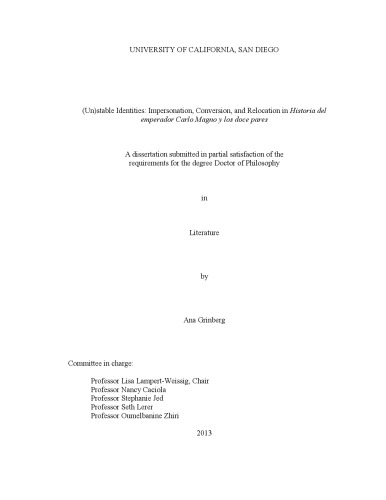Product desciption
Unstable Identities Impersonation Conversion And Relocation In Historia Del Emperador Carlo Magno Y Los Doce Pares Ana Grinberg by Ana Grinberg instant download after payment.
This dissertation explores late medieval and early modern representations of racial and religious identity as represented in several renditions of a very popular book of chivalry. Originally composed in French during the twelfth-century, Fierabras was translated to Middle English, Castilian, Italian, German, and Latin. Furthermore, it was adapted to different genres and referenced in major works, as Miguel de Cervantes' Don Quijote and Franc̦ois Rabelais' Pantagruel. Some versions have been extensively studied, but the Castilian translation--Hystoria del emperador Carlo Magno y delos doze pares de Francia & dela cruda batalla que ouo Oliveros con Fierabras, Rey de Alexandria (dated 1521)-- has received scant scholarly attention. My dissertation addresses this lack, exploring the process of imagining identity--both on an individual and social scale--that is central to the formation of Western European states. The focus here is a comparative study of three versions of Fierabras, engaging on close readings that provide a clear depiction of identity and difference. In examining instances of labeling, religious conversion, "ethnic passing," and their political underpinnings, I consider some of the intricacies of European representations of Spain and Spain's self-representation as a religiously and ethnically homogenous nation. The Castilian version of Fierabras illustrates the need to imagine Spain as a "pure, contained space"--a concept developed by Barbara Fuchs' Exotic Nation--as a response to the orientalization of Spain by its "European rivals" (3). Nicolás de Piemonte, the Castilian translator, modified consistently his source (Jehan Bagnyon's Histoire de Charlemagne [c. 1470]). These modifications include the apparent fluidity of identity, the relevance of blood and lineage over dermal differences, and cultural practices that serve to separate religious and ethnic communities. From the sixteenth century on, Piemonte's translation became very popular in the Iberian colonies in Africa and America. Thus, I assert that this text became the vehicle for the propagation of specific ideas about the Self and the Other, about Christianity and other religions, and about loyalty and allegiance to the sovereign.


